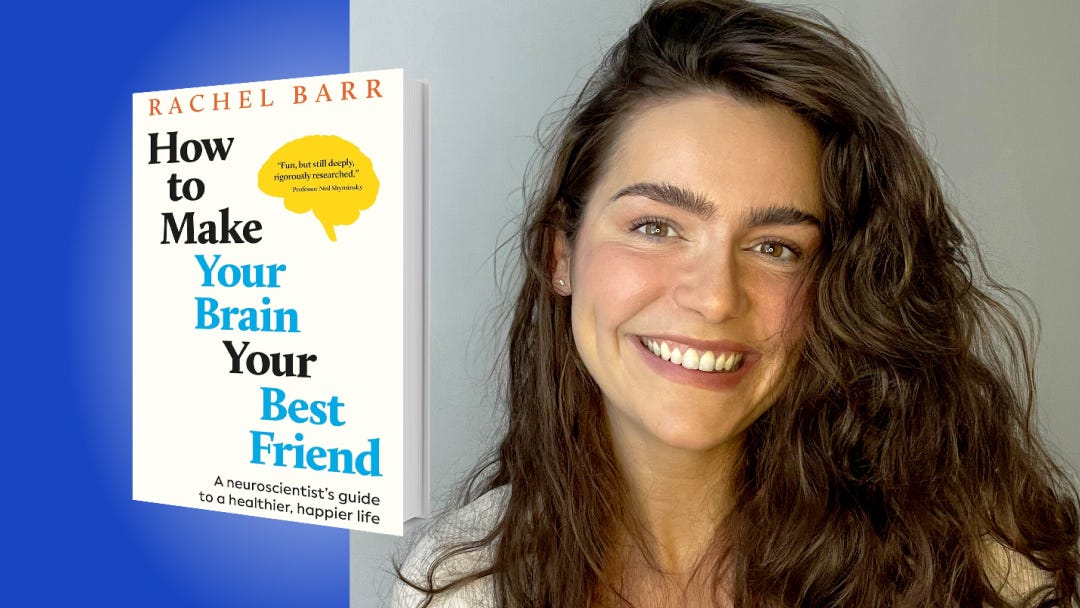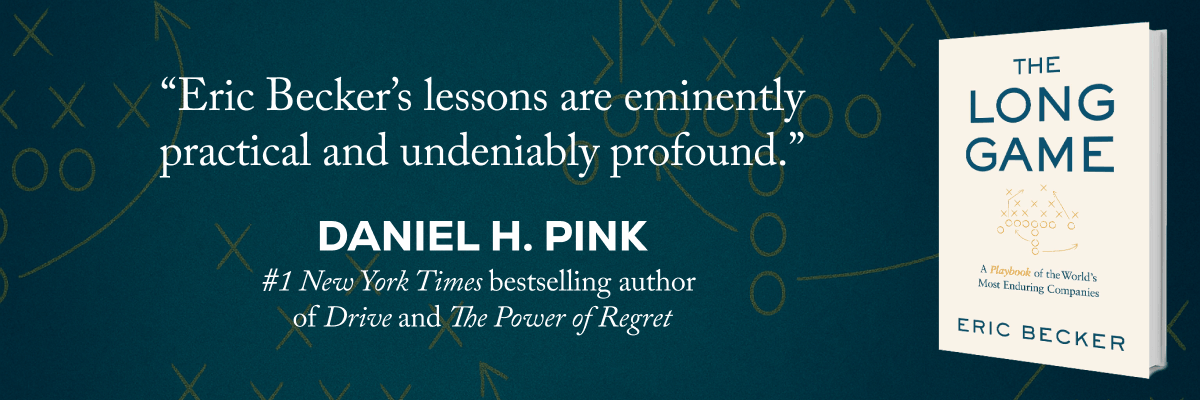5 Tiny Habits That Make Your Brain Happier
A neuroscientist busts brain myths and offers small, doable rituals that actually help.
Listen now on Spotify or Apple Podcasts:
If you’ve ever caught your mind spiraling at 2 a.m.—replaying mistakes, forecasting disasters—you know how it can feel like to have your brain working against you. But what if you could train it to be your ally instead of your adversary?
In How to Make Your Brain Your Best Friend, author and neuroscientist Rachel Barr lays out a practical playbook for turning down the volume on unhelpful loops and turning up the habits that build clarity, calm, and positive momentum. Get yourself a copy on Amazon and read on for five of her key insights:
1. Don’t treat your brain like an enemy combatant.
There is a certain cultural pride in gritting your teeth and muscling through the hard stuff. We’re told that pleasure is indulgent, struggle is noble, and if you’re not doing something difficult, then are you even trying?
But life is already difficult: emotionally, physically, metabolically. Whether it’s dragging yourself through a workday, keeping a tiny human alive, or coping with grief, most days involve a decent amount of involuntary discomfort. You don’t need to manufacture more.
Contrary to popular self-help lore, willpower isn’t how humans function. Brains are energy-budgeting, and when they resist something, there’s often a reason—or at least a signal worth decoding.
Take cravings, for example. Research has shown that when emotional reserves are low, your brain will reach for easy dopamine, like pizza, wine, or Instagram, because it is tired and trying to feel better. When we try to brute-force our way through resisting a craving by using sheer willpower, we often fail and then shame ourselves for it. A friendlier approach is to redesign the conditions so that the better choice is the easier option.
Meet the need underneath. Maybe have yourself a fried treat, but then also provide your brain with the fuel source it might be crying out for: feeling good. Go outside. Play with a dog. Text someone whose name doesn’t fill you with dread and chat about something silly. Microdose delight daily. It’s a better bet than willpower.
2. Single-tasking is a kindness.
We treat attention like it’s limitless. We sit at our desks, shoulders hunched to our ears, semi-listening to a Zoom meeting as we Slack, email, and scroll social media. The brain, meanwhile, responds to this commotion by unravelling.
“Studies show that we are more likely to believe misinformation when we’re exposed to it while multitasking.”
Attention is limited. Media multitasking taxes working memory and control networks. You’re switching tasks, and even brief switches can compound into stress and fatigue. Worse still, studies show that we are more likely to believe misinformation when we’re exposed to it while multitasking. And once misinformation gets in, it can be incredibly difficult for the brain to let go of it. Divided attention leaves less bandwidth for discernment and less cognitive energy to even attempt it.
If you’re going to scroll TikTok, just scroll TikTok. Give it your full attention. It won’t make the algorithm more virtuous, but it might make your brain a tiny bit sharper when it matters most.
This week, Book of the Day is brought to you by The Long Game: A Playbook of the World’s Most Enduring Companies by Eric Becker. Through meticulous research and in-depth interviews with CEOs, historians, and key decision makers, this book delves into the pivotal strategies and decisions that enabled them to adapt and remain competitive on a global stage. Pick up your copy today
3. Microdose delight.
In the modern world, it’s not danger that wears us down, but the ongoing hum of low-grade stress. Beyond a certain threshold of stress, the brain loses its capacity to rein in the stress response team, called the HPA axis, and the body responds to the stress as though it were an injury. This pro-inflammatory state can wreak havoc on mental and physical health, which is why we must manually push the brakes on stress ourselves, several times a day… by microdosing delight.
Just delight in miniature, blink-and-you-miss-it pleasures: petting a warm dog, birdsong on your walk, climbing into clean sheets, watching two old lovers giggling like teenagers. Brief moments of genuine delight give your nervous system a momentary sigh of relief. They act as safety cues that downshift threat physiology. You can’t wait for the weekend or your vacation for a big sporadic dump of relaxation. By then, your poor body and brain will have suffered the lash of stress for days or weeks.
Which is why you must create opportunities to be delighted, several times a day. Step away from distraction into a space where delight is likely to happen. Step outside for five minutes if you’re at work. Take your lunch break at a cat café, if you can. The point isn’t constant bliss; it’s to break the continuity of stress so your system remembers it can shift state, little and often.
4. Sleep builds tomorrow’s brain.
When you sleep, you don’t just rest. You consolidate. The brain plays back your day like a slightly confused film editor, cutting together what stays and what gets tossed: emotions that mattered, details that seemed important, your boss’s weird comment about your haircut, the joke you made on Slack that got zero emojis of approval. Importantly, what you think about right before sleep tends to stick. If you replay a loop of self-criticism right before bed, then your brain is likely logging that.
“You must create opportunities to be delighted, several times a day.”
Of course, it’s not so easy to avoid thinking about your boss’s weird comment, just as you can’t tell yourself not to think of a pink elephant. But you can overlay some gentler input: something you’re proud of. A minor triumph you’d otherwise forget. A thing you liked about yourself today. Think of it as setting the neurochemical mood music for the night shift crew.
5. You can’t feel you belong if you secretly hate everyone.
Loneliness is a threat to health equal to obesity and smoking. But it isn’t always solved by meeting up with a friend. Sometimes it’s a signal that we’ve lost our sense of belonging to humanity itself.
Belonging isn’t about proximity. It’s about identification. It’s about looking at your species and feeling like you’re one of them. The digital world makes this very hard. When your TikTok feed is 100 percent curated to show the worst of us, it gets harder to feel like you’re on Team Human.
Those viral Karen videos filling you with rage? Many of them are staged, designed specifically to manipulate anger responses. Your poor brain just logs it all as “typical human behavior,” thanks to a processing bias called the availability heuristic. It might feel oddly good to rail against strangers online, but what you’re really doing is training yourself to dislike humanity. Viewing everyone as selfish, awful, and contemptible is the factory setting for loneliness.
So yes, work on your friendships, build connections, and try to be a likable human. But work on your capacity to like other people, too. Curate your inputs. Choose media that makes you feel closer to, not disgusted by, other humans. Your brain’s worldview depends on what you feed it.







Cheers, Micheal! 🧠🖤
But, what if the other people are wrong. They know it, but still they won't acknowledge publically. (I am talking this with respect to the 5th habit)